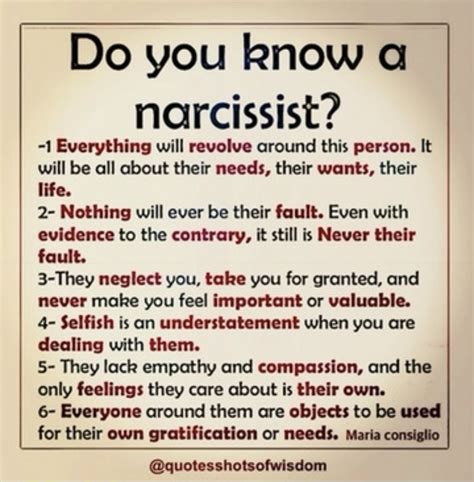
Cutting through manipulative tactics may be possible by employing specific phrases designed to dismantle a narcissist’s control, according to experts. These phrases target the core vulnerabilities of narcissistic personalities, disrupting their ability to manipulate and maintain dominance in relationships.
Narcissistic Personality Disorder (NPD) is a mental condition characterized by an inflated sense of self-importance, a deep need for excessive attention and admiration, troubled relationships, and a lack of empathy for others, according to the Mayo Clinic. Individuals with NPD often exhibit manipulative behaviors to maintain their inflated self-image and control over others. However, experts suggest that certain strategic responses can effectively challenge these behaviors.
“Narcissists thrive on control and validation,” explains a report detailed in Yahoo Lifestyle. “Phrases that undermine these needs can disrupt their manipulative patterns.”
One such phrase is: “I understand that’s your opinion.” This response acknowledges the narcissist’s statement without validating it, effectively neutralizing their attempt to impose their viewpoint as the only correct one. It sets a boundary and asserts the responder’s right to their own perspective.
Another effective phrase is: “I need some time to think about that.” This phrase thwarts the narcissist’s desire for immediate compliance and control. By delaying a response, the individual reclaims their autonomy and avoids being pressured into decisions they may later regret.
“No,” is a simple yet powerful word that can dismantle a narcissist’s control. Narcissists often expect and demand compliance, so a direct refusal can be highly effective in setting boundaries. It’s a clear assertion of personal autonomy and can be incredibly disarming.
The phrase, “I am not going to discuss this with you right now,” is particularly useful when a narcissist attempts to provoke an argument or engage in circular reasoning. This statement firmly sets a boundary and refuses to engage in unproductive conflict. It signals that the individual will not be drawn into manipulative tactics.
“You may be right,” is a phrase that concedes the possibility of the narcissist being correct without fully validating their self-importance. This response can diffuse tension and avoid escalating conflict, while also maintaining a degree of emotional detachment. It suggests openness to alternative viewpoints without necessarily agreeing.
Narcissistic individuals often rely on gaslighting, a manipulation tactic that causes someone to question their own sanity. Gaslighting can involve denying reality, twisting facts, or making someone feel like they are losing their mind. Recognizing and countering gaslighting is crucial in dealing with narcissists.
One of the challenges in dealing with narcissists is their tendency to project their own flaws and insecurities onto others. This defense mechanism allows them to avoid taking responsibility for their actions and maintain their inflated self-image. Understanding this projection mechanism can help individuals avoid internalizing the narcissist’s criticisms.
Setting clear and consistent boundaries is essential in any relationship with a narcissist. Boundaries define acceptable and unacceptable behaviors, and they help protect individuals from manipulation and abuse. Enforcing these boundaries consistently is crucial, as narcissists will often test them to see how far they can push.
Communicating assertively is also key. Assertive communication involves expressing one’s needs and opinions clearly and respectfully, without being aggressive or passive. It’s about standing up for oneself while also respecting the rights of others.
It’s important to remember that dealing with a narcissist can be emotionally draining. Seeking support from friends, family, or a therapist can provide valuable perspective and coping strategies. Therapy can also help individuals heal from the emotional damage caused by narcissistic abuse.
Ultimately, the goal is to protect one’s own mental and emotional well-being. This may involve limiting contact with the narcissist, setting firm boundaries, and seeking professional help. It’s about recognizing that one cannot change the narcissist, but one can change how they respond to their behavior.
The effectiveness of these phrases lies in their ability to disrupt the narcissist’s manipulative patterns and assert the individual’s autonomy. By setting boundaries and refusing to engage in their games, individuals can regain control of their interactions and protect their own mental and emotional well-being.
The long-term effects of narcissistic abuse can be profound, including anxiety, depression, and post-traumatic stress disorder (PTSD). Recognizing the signs of narcissistic abuse and seeking help is crucial for healing and recovery.
These phrases are not a cure-all, and dealing with a narcissist can be a complex and challenging process. However, they offer a starting point for individuals seeking to regain control and protect themselves from manipulation. It’s crucial to remember that prioritizing one’s own well-being is paramount in any relationship with a narcissist.
Beyond the specific phrases, experts emphasize the importance of understanding the underlying dynamics of narcissistic behavior. This includes recognizing the narcissist’s need for control, their lack of empathy, and their tendency to manipulate others to meet their own needs.
The key is to remain calm, assertive, and focused on one’s own well-being. By refusing to engage in the narcissist’s games and setting clear boundaries, individuals can protect themselves from emotional harm and regain control of their lives.
Dealing with a narcissist is not about trying to change them, but about changing how one responds to their behavior. It’s about recognizing that one cannot control the narcissist’s actions, but one can control their own reactions.
In conclusion, while these phrases offer a strategic approach to navigating interactions with narcissists, they are part of a broader strategy focused on self-preservation, boundary setting, and understanding the underlying dynamics of NPD.
Expanded Context and Further Strategies
The phrases highlighted in the initial report provide a tactical advantage in specific situations, but a more comprehensive strategy is required for long-term management of relationships with individuals exhibiting narcissistic traits. This strategy includes understanding the core vulnerabilities of a narcissist, recognizing their common manipulative tactics, and developing robust coping mechanisms.
Understanding Narcissistic Vulnerabilities:
At the heart of NPD lies a profound sense of insecurity and inadequacy, masked by an outward display of grandiosity and self-importance. This inherent fragility makes narcissists extremely sensitive to criticism, rejection, and any perceived threat to their inflated self-image.
- Fear of Exposure: Narcissists are deeply afraid of being exposed as flawed or inadequate. They invest significant energy in maintaining a facade of perfection and competence. Any perceived vulnerability or weakness is met with defensiveness, denial, or projection.
- Need for Validation: The relentless pursuit of admiration and validation stems from a deep-seated insecurity. Narcissists require constant reassurance from others to maintain their sense of self-worth. This need can manifest as excessive boasting, attention-seeking behavior, and a relentless demand for praise.
- Emotional Emptiness: Despite their outward bravado, narcissists often experience a profound sense of emotional emptiness. They struggle to form genuine connections with others and may use people as objects to fulfill their own needs. This emotional void contributes to their manipulative behavior and lack of empathy.
- Fear of Abandonment: While seemingly self-sufficient, narcissists often harbor a deep fear of abandonment. This fear can drive them to manipulate and control their relationships to ensure that they remain the center of attention and maintain their sources of validation.
Recognizing Manipulative Tactics:
Narcissists employ a variety of manipulative tactics to control others and maintain their dominance. Recognizing these tactics is crucial for protecting oneself from emotional harm.
- Gaslighting: As previously mentioned, gaslighting involves distorting reality to make someone question their sanity. This can involve denying events, twisting facts, or making someone feel like they are imagining things.
- Triangulation: Triangulation involves bringing a third party into a relationship to create conflict and manipulate the dynamics. The narcissist may use one person to relay messages to another, or they may play people against each other to gain control.
- Idealization, Devaluation, and Discard: This cycle is common in narcissistic relationships. The narcissist initially idealizes their partner, showering them with attention and affection. Over time, they begin to devalue their partner, criticizing them and finding fault in everything they do. Eventually, they may discard their partner altogether, often abruptly and without explanation.
- Emotional Blackmail: Emotional blackmail involves using guilt, threats, or intimidation to manipulate someone into doing something they don’t want to do. The narcissist may threaten to harm themselves or others, or they may use guilt trips to make their partner feel responsible for their happiness.
- Blame-Shifting: Narcissists rarely take responsibility for their actions. Instead, they blame others for their mistakes and failures. This allows them to avoid confronting their own flaws and maintain their inflated self-image.
- Playing the Victim: Narcissists often portray themselves as victims to garner sympathy and manipulate others. They may exaggerate their hardships or blame others for their problems to elicit attention and support.
- Hoovering: After a discard, narcissists may attempt to “hoover” their former partner back into the relationship. This can involve contacting them with apologies, promises of change, or expressions of longing. The goal is to re-establish control and continue the cycle of abuse.
Developing Coping Mechanisms:
Dealing with a narcissist requires a proactive and strategic approach. Developing robust coping mechanisms is essential for protecting one’s mental and emotional well-being.
- Setting and Enforcing Boundaries: Boundaries are essential for defining acceptable and unacceptable behavior. It’s crucial to set clear and consistent boundaries with narcissists and to enforce them firmly. This may involve saying “no,” limiting contact, or ending the relationship altogether.
- Detachment: Emotional detachment involves creating distance between oneself and the narcissist’s behavior. This doesn’t mean ceasing to care, but rather choosing not to engage in their manipulative tactics or internalize their criticisms.
- Self-Care: Engaging in self-care activities is crucial for maintaining mental and emotional well-being. This can include exercise, meditation, spending time with loved ones, or pursuing hobbies.
- Seeking Therapy: Therapy can provide valuable support and guidance in dealing with a narcissist. A therapist can help individuals process their emotions, develop coping strategies, and heal from the emotional damage caused by narcissistic abuse. Cognitive Behavioral Therapy (CBT) and Dialectical Behavior Therapy (DBT) can be particularly helpful.
- Building a Support System: Connecting with friends, family, or support groups can provide a sense of community and validation. Sharing experiences with others who understand narcissistic abuse can be incredibly helpful.
- Documenting Abuse: Keeping a record of abusive incidents can be helpful for validating one’s experiences and providing evidence if legal action is necessary.
- Understanding Legal Options: In some cases, legal intervention may be necessary to protect oneself from a narcissist. Consulting with an attorney can help individuals understand their rights and options.
Beyond the Individual:
The impact of NPD extends beyond individual relationships. Narcissistic traits can be observed in various contexts, including the workplace, politics, and even societal trends.
- Narcissism in the Workplace: Narcissistic bosses can create a toxic work environment characterized by micromanagement, lack of empathy, and a focus on self-promotion. Understanding narcissistic dynamics in the workplace can help employees navigate these challenges and protect their careers.
- Narcissism in Politics: Some argue that narcissistic traits are increasingly prevalent in political leaders. This can lead to policies that prioritize self-interest over the needs of the population, and a disregard for ethical considerations.
- Societal Trends: Some researchers suggest that modern society, with its emphasis on individualism, self-promotion, and social media validation, may be contributing to an increase in narcissistic traits.
Long-Term Considerations:
Dealing with a narcissist is often a long-term process that requires ongoing vigilance and self-awareness. It’s important to remember that narcissists are unlikely to change, and that the focus should be on protecting oneself and prioritizing one’s own well-being.
Ultimately, the decision of whether to stay in a relationship with a narcissist is a personal one. However, it’s crucial to make that decision with a clear understanding of the dynamics involved and a commitment to protecting oneself from emotional harm.
Frequently Asked Questions (FAQs):
1. What is Narcissistic Personality Disorder (NPD)?
Narcissistic Personality Disorder (NPD) is a mental condition characterized by an inflated sense of self-importance, a deep need for excessive attention and admiration, troubled relationships, and a lack of empathy for others, according to the Mayo Clinic. It is a complex disorder that significantly impacts the individual and those around them. Individuals with NPD often exhibit manipulative behaviors to maintain their inflated self-image and control over others.
2. How do I know if I am dealing with a narcissist?
Some common traits of narcissists include: a grandiose sense of self-importance, a need for constant admiration, a lack of empathy, a tendency to exploit others, a belief that they are special and unique, a sense of entitlement, and arrogance. They also tend to be highly sensitive to criticism and have difficulty handling rejection. However, only a qualified mental health professional can diagnose NPD. If you are concerned about someone’s behavior, it’s best to consult with a professional.
3. What are some common manipulation tactics used by narcissists?
Narcissists employ a variety of manipulative tactics to control others and maintain their dominance. These tactics include gaslighting (distorting reality), triangulation (involving a third party to create conflict), idealization, devaluation, and discard cycles, emotional blackmail (using guilt or threats), blame-shifting (avoiding responsibility), playing the victim (seeking sympathy), and hoovering (attempting to draw someone back into the relationship after a discard).
4. Can a narcissist change?
While it is possible for individuals with NPD to change, it is a very difficult and challenging process. It requires a willingness to engage in long-term therapy and a deep commitment to self-reflection and behavioral change. Even with therapy, significant and lasting change is not always guaranteed. It’s generally more effective to focus on changing how you respond to the narcissist’s behavior rather than trying to change them.
5. What can I do to protect myself from a narcissist?
Protecting yourself from a narcissist involves several strategies: setting and enforcing clear boundaries, practicing emotional detachment, prioritizing self-care, seeking therapy, building a strong support system, documenting abusive incidents, and understanding your legal options. In some cases, limiting or ending contact with the narcissist may be necessary to protect your mental and emotional well-being. The phrases highlighted in the article, such as “I understand that’s your opinion,” “I need some time to think about that,” “No,” “I am not going to discuss this with you right now,” and “You may be right,” can be useful tools in managing interactions with a narcissist. They help you assert your boundaries and avoid being drawn into their manipulative games. Remember, prioritizing your own well-being is paramount.









